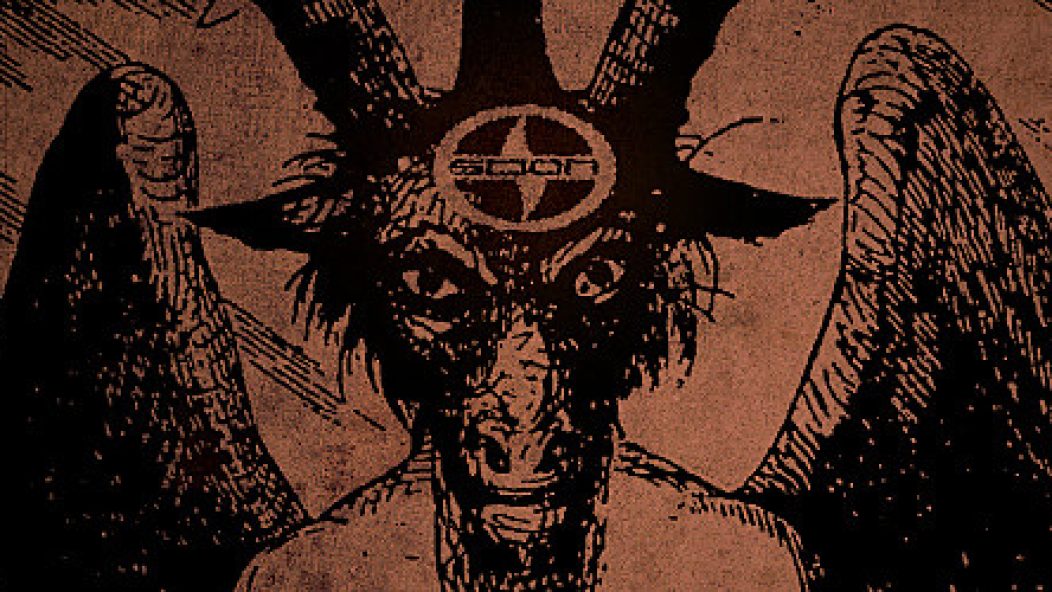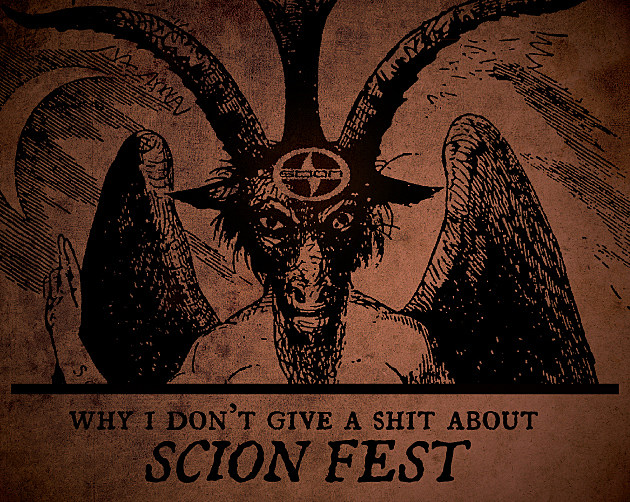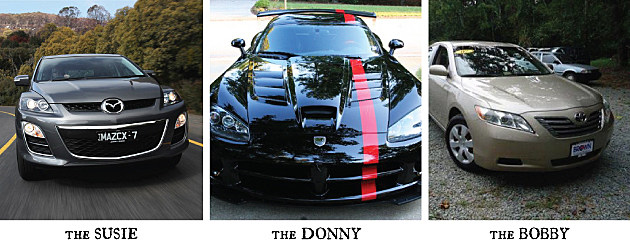
Why I Don't Give a Shit About Scionfest

I’m a pistonhead. When I’m feeling witty and subversive, I refer to myself as a petrosexual. In plain terms, I just love cars. I love driving them, looking at them, talking about them, listening to them. I can listen to a car motor and tell how many cylinders it’s got, and how it’s been aspirated. Any metalhead who can tell the difference between a vintage Sunlight production and a vintage Studio Fredman recording understands what I mean, even if they can’t tell two motors apart by sound.
Cars are a nearly universal subject in the First World. I can talk to Susie Soccermom, Bobby Bureaucrat, and Donny Drifter about their cars, and still enjoy an engaging and entertaining conversation. Susie really likes her SUV’s cupholders and metallic paint job. Bobby thinks his car is reliable, comfortable and gets good gas mileage. Donny likes that his Silvia’s got a totally sick JDM SR20DET swap, brah. Doesn’t matter to me, it’s all cool. I understand all three ways of thinking about cars.
Susie, Bobby, and Donnie and their lines of thinking are quite literally the reason why it doesn’t matter how many fests and EPs Scion/Toyota sponsors. Metalheads and their automotive choices are going to fall into one of the three categories of behavior, none of which will be particularly affected by Scion sponsorship.
Susie Soccermom is the metalhead who completely does not care what he or she drives, but instead buys based on an emotional feeling that centers on one or two factors independent of brand. If a Scion has the best cupholders, or a Honda minivan lets her lug the most stuff around, that’s what she buys. Susie, like many people, doesn’t even know that Scion is a Toyota product. She thinks they are funky-looking cars that are, for some reason, almost exclusively owned by old people.
When Susie buys metal, she’s going for specific emotional criteria: Trouble is really doomy but Electric Wizard is too noisy. She doesn’t know or care what label Immortal is on, she’ll just buy an Immortal album because it’s an Immortal album, and she likes Immortal. Nobody can predict Susie’s tastes in music because it’s totally arbitrary – she can’t even predict it herself. Susie makes a lot of blind purchases and often buys on a recommendation, which could very well happen when she goes car shopping. Susie hopes you like her taste in music, but she’s not dedicated enough to argue about it, so long as you don’t go out of your way to insult her. She’s not a conformist, but she’s following her heart wherever it takes her.
In all fairness, Susie is the metalhead who will most likely be affected by the Scion sponsorship, simply because it makes her aware that the brand exists. Toyota is a very smart company that looks years ahead when planning products. It spent more than 25 years steadily grinding the Detroit Three into the dirt by taking the long view. Scion sponsorship will make metalheads aware of the brand’s existence, and Toyota will be satisfied with that because it’s part of a business plan with far-reaching goals. Where this whole plan might backfire on Toyota is that Susie could wander into a Scion dealership, think that the xB has dumb taillights or costs too much, or whatever, and then head on over to another manufacturer’s dealership. Susie might also actively dislike Scion because she decides that a corporation sponsoring heavy metal isn’t cool. She’s just too fickle to be a surefire investment for a big corporation.
Bobby Bureaucrat is the metalhead who is largely immune to mainstream forms of advertising. He browses a few specific websites for music recommendations, but he’ll still listen to samples or pirate an album before buying. He has a very clear understanding of what he likes in terms of genre, or within a genre itself. He does a lot of research. If Bobby ever makes a blind purchase, it’s a band that he really loves, or a site that he totally trusts, but these situations are few and far between. Word of mouth does carry weight with him, but again, only as long as it’s a trusted source.
Website ads, gear sponsorships in albums, music videos and recommendations on streaming or music purchase websites don’t matter to Bobby. He’s too knowledgeable and too dedicated for those types of advertising to affect him or his opinion. Bobby is by and large a stereotypical metalhead, and probably represents the bulk of metalheads. He doesn’t much care what you think about his taste in cars or music, because he knows what works for him, and that’s all he cares about.
Scion’s sponsorship will fail on Bobby, because he already knows that Scion exists and that it’s a Toyota product, and those facts don’t matter to him. He’s going to do research on price, features, reliability, and so forth before buying, and he’s not going to rely on biased advertising to make his decision. Bobby’s not a total machine, so there is a slight chance he’ll buy a Scion based on perception, but most of the time, if Scion makes the best product for Bobby’s criteria, Toyota’s getting a sale. If another manufacturer’s product fits Bobby’s needs or wants, Toyota’s shit outta luck.
I’m a Donny Drifter both when it comes to cars and metal. Donny is a total metal nerd. His mp3 archive is meticulously archived and tagged. He can articulate the difference between prog-death and tech-death, and he’s happy to argue with you about it. He can rattle off every Iron Maiden song in order for every Iron Maiden album. Donny will not buy an album based on advertising or reviews. He’s going to make up his own mind, song by song and album by album.
Donny buys a car based on his exhaustive knowledge of cars and very specific technical criteria that most people neither understand nor care about. Donny would buy a Lancer Evo IX because it’s a raw, angry rally car for the street, but he won’t buy an Evo X. Sure, Mitsu finally gave American fans the trick torque-vectoring AWD system, but the Evo X got fat and relatively soft in the process, so Donny doesn’t want that bullshit. Donny buys a used first-generation Honda Insight because it’s still the hyper-miling champ if driven properly, and not a bloated toad like the Toyota Prius. Donny hates Toyota, and therefore Scion, because he thinks Toyotas are boring and reliable transportation appliances for people like Susie who don’t care, or for people like Bobby who have no automotive soul because they don’t like the right performance figures.
Donny knows most Century Media releases are crap because Century Media sold out, but he’ll still investigate each album because that’s how he’s mentally wired. Donny will download 15 obscure black metal albums to get that triumphant feeling of finding an obscure gem. Donny is attracted to the stats of cars, and will state his opinions on metal in a factual way, but all of this occurs because he’s attracted to the data in an emotional sense, rather than a purely pragmatic sense. Stats aren’t just a means to an end, they’re a way of validating what he feels; he can be irrational but he’ll still fall back on the ‘facts’. They’re also his way of proving that he’s right and that you aren’t.
Scion’s efforts are totally wasted on a Donny. When he buys a car, his choice is either going to be well researched and logical, or based on extreme emotional appeal dictated by specific stats. Sponsorship will achieve nothing with Donny, nor will advertising in general. Scion sponsorship is likely to alienate Donny because he doesn’t want a big corporation getting involved in his scene.
To compare a metalhead buying a car to a mainstream person buying a car, we need to understand why advertising will work on mainstream consumers. Most mainstream car buyers are a mix of Susie and Bobby. They will buy based on shallow research regarding a few features, along with anecdotal stories and general perception. Toyota has been successful with these people because it has steadily built up the perception (and, generally, the reality) that its cars are reliable and high quality. Catering to the lowest common denominator with cars works. It’s why the Toyota Camry sells in massive numbers, but a specialist car like a Mazdaspeed3 or Camaro SS doesn’t. The metalheads that attend Scionfest are not the lowest common denominator; they’re listening to the equivalent of a specialist car, not a Camry. Appealing to tiny niches is not a recipe for massive success in either the recording or automotive industries.
Not only that, I think that about 70% of metalheads are Bobby, 20% are Donny, and 10% are Susie. Metalheads are too dedicated, too nerdy, for advertising to do much in any aspect of their lives. We like the deep, the esoteric, and the obscure. Toyota misunderstands how we think, or understands us and is nevertheless betting that all of the heavy metal Bobbys won’t extend their methodical thought process to buying a car. In other words, they’ll magically morph into Susie at the car dealership because Scion has bought itself some cool.
Between Scionfest, paying for a few EPs, and the corporate business process to conceive and administer all of it, Toyota has to have spent a few million dollars on the sponsorship project. According to Kelly Blue Book, the dealer invoice on a base, automatic 2011 Scion tC is $19,041; that’s what the dealer pays Toyota for the car. The companies that I’ve worked for have all aimed for 30% profit on a sale, so that’s $4,410 per tC. If sponsorship actually sells 1,000 tCs to us, Toyota will already have a nice chunk of change. The problem for Toyota is that, by my estimation, 90% of our scene won’t pay much attention to the sponsorship, but we might buy a Scion anyway for unrelated reasons. Right away, that is tens of thousands, maybe hundreds of thousands, of people on whom the campaign was wasted. The remaining 10% are so fickle and arbitrary that Toyota is gambling against unknown odds at making sales. A few million dollars is a rounding error for Toyota, but I have literally no idea how the company can determine if the Scion A/V campaign is working. Do they ask that question when a person buys a car?
However, Toyota bets long, remember? This campaign isn’t trying to recoup its cost quickly. It’s trying to make us loyal to Scion so that we keep buying one every five years, which will really ring the cash register for Toyota. Unfortunately for the big T, our mindsets are either too methodical or too random for any car brand to really take root. If the Toyota people asked me, I’d tell them to go spend their money at a college or high school. Toyota got huge by playing for the lowest common denominator and never losing sight of a long term goal, so why fish for sales in such a tiny pond?
Just to be clear, I’m not concerned that Scion is sponsoring heavy metal. I’m actually in favor of it! My understanding of the Scion-band relationship is that the band puts a few Scion symbols on their EP or stage, Toyota cuts a check, and there’s an understanding that the band won’t record a song called “Corollas are Worthless Odious Detritus”, or slag the company in the press. The chances of most metal bands specifically criticizing Toyota are virtually nonexistent even before they get involved with Scion A/V. The relationship so far between band and brand is very, very shallow. When the bands are paid middle class wages directly by Toyota to do nothing but record and tour, I’ll start getting upset. If a band truly objects to corporate sponsorship, they can avoid Scion entirely, or stop accepting money and go back to the traditional or internet era recording industry business models. Who are we to know why Enslaved accepted Scion’s money? We don’t know the truth of their hearts. Anything we say is just idle speculation until Enslaved comes out and states they’ve sold out, so why worry?
If our bands aren’t selling out and we aren’t going to be affected by the advertising, why are we so angsty about Scion sponsoring anything metal-related? There will be a few exceptions where Scion sponsorship actually sells a car to a metalhead, but metal is going to benefit more from Toyota than vice versa. Let’s be honest about this: the old recording industry and labels are dying. There just isn’t much money for bands to spend in the studios. During the Renaissance, when humanity’s greatest artistic works were created, the composers and painters and sculptors were sponsored by rich patrons, cities, and the church. There was no other reasonable way for a Renaissance artist to put bread on the table, and yet their work still has immense artistic and emotional value. If it worked in the Renaissance, why can’t sponsorship by third parties work now for heavy metal?













